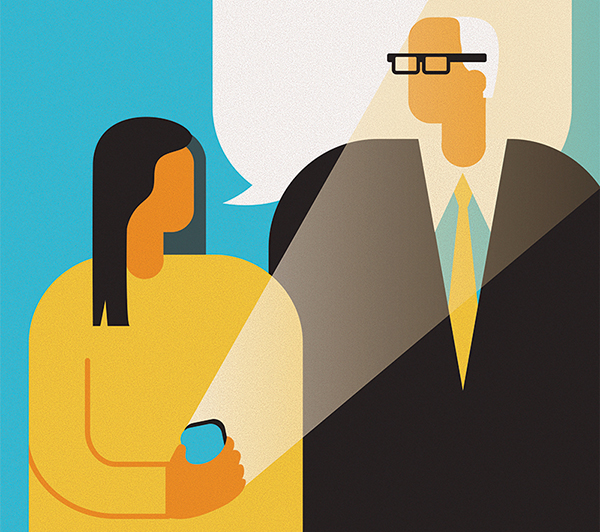By 2020, about half the workforce will be made up of millennials, people born from the early 1980s to the mid-1990s. One of the ways big corporations like Microsoft and Target are bridging the generation gap is reverse mentorship. It pairs a younger worker with a company veteran so the latter can learn from the former.
U of A business student Christina Luo, who recently did a stint as ATB's Google ambassador, reverse mentored Lorne Rubis, '73 BEd, ATB's first chief evangelist (an executive who helps a company adapt to new technologies). Rubis and Luo each saw the opportunity as a learning experience. They offer some tips for the uninitiated.
Collaborate, don't compete
Studies from the Zur Institute, an organization that provides continuing education to counselling psychologists and other health-care professionals, show that millennials learn best through participation and intuition instead of linear manuals. They thrive on collaboration and trial-and-error. For example, Rubis says, when he's working with Luo, "we get stuff done. We work through conversations, not necessarily through structured meetings."
Break power barriers
Rubis says that millennials, who've grown up with the internet, tend to see the world as more egalitarian than his generation. He encourages this non-traditional attitude by bringing Luo into board meetings and introducing her to people in different positions to "remove the aura of power."
Tech it up a notch
While the digital savvy of millennials can certainly help keep companies trending on social media, that's not the only technical skill they have. Luo helps Rubis make sure ATB's live online broadcasts stream smoothly to audiences of up to 1,300 viewers. "She's so intelligent," Rubis says of Luo, "she writes code for fun."
Try new things
Rubis says that Luo often comes to him with ideas she gleans from a variety of sources, such as Twitter or podcasts. He mentions the seven-star design principle of Airbnb, in which a host anticipates your ideal holiday and takes steps to make it happen. It's a new model for thinking outside the box. "I had no idea some of this was out there," Rubis says of the information Luo uncovered. "I learned to be more fearless and open to experimenting."
Communicate openly
The dissolution of traditional mentor roles comes with a steep learning curve on how to communicate. Says Luo, "I had to learn not to ask for permission to do what I think is right." Rubis adds, "I learned how much I didn't know, and I had to learn to be vulnerable in that regard."

We at New Trail welcome your comments. Robust debate and criticism are encouraged, provided it is respectful. We reserve the right to reject comments, images or links that attack ethnicity, nationality, religion, gender or sexual orientation; that include offensive language, threats, spam; are fraudulent or defamatory; infringe on copyright or trademarks; and that just generally aren’t very nice. Discussion is monitored and violation of these guidelines will result in comments being disabled.